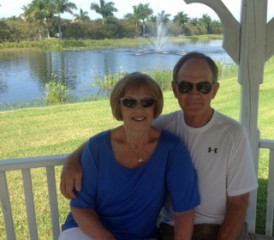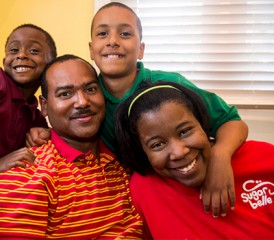Mother’s Mesothelioma Recovery Sparks Son’s Belief in Medicine

Fact Checked | Written by: Tim Povtak | Last Update: 10/24/2024 | 6 Min Read
Sara B. watched her own life change dramatically, from a shocking diagnosis of peritoneal mesothelioma cancer into an inspiring comeback story.
She also watched her oldest son, John, absorb it all and make a life-changing choice from her experience.
“He wants to be a surgeon now,” Sara said proudly of her son, a senior in high school. “My disease, and what I’ve been through, really encouraged him, pushed him hard in that direction. He saw up-close what an impact a surgeon can have. It became a real wake up call for him. For that, I’m thankful.”
Sara, 46, whose last name is being withheld over privacy concerns, is a mesothelioma survivor who is thriving, a stark contrast to the gloom and doom that hangs ominously over the typical diagnosis of this horrendous disease.
She had extensive cytoreductive surgery and hyperthermic intraperitoneal chemotherapy (HIPEC) in May, suffered through an excruciating, intensive care recovery and later a debilitating chemotherapy regimen, but she has emerged with a contagious optimism.
“I’m not saying it’s easy – you have to go through hell to get better – and I told my doctor one day to either kill me, or put me in a coma, because I couldn’t take it anymore,” she said. “But you can get through this. I’m proof there is hope out there. If it wasn’t for this horrible scar on my belly today, you’d never know I was sick. I feel as good as ever.”
Living Life Again in France
Sara was speaking not long after snow skiing with the family. She had just finished another aqua-jogging session and felt strong and confident. She is making plans to return to work.
Her first two post-surgery scans showed no signs of cancer recurrence.
Sara lives in Bordeaux, France, with her husband and two sons. Although she was born and raised in California, attending the University of Colorado, she has spent the last 20 years in Europe.
“I was in the states, working my first job out of college when this young Frenchmen just swept me off my feet, and convinced me to move,” she said with a laugh. “He was my intern at the bank. But that’s another story.”
After she was swept away, the couple lived in Switzerland, England, Belgium and Germany – all part of his career path in international business – before returning to France, where they have been the past five years.
She was diagnosed with mesothelioma in April, almost by chance, after seeing a doctor about a bladder infection. A precautionary ultrasound of her kidneys turned into more thorough tests of her entire abdominal cavity, which revealed a stunning find.
“When my doctor walked into the room to give me the results, he looked like death. His expression told me there was a real problem,” she said. “I went in there thinking it might be nothing, a girly cyst or something minor. Never did I think it could be a cancer, certainly not mesothelioma.”
Mesothelioma is a rare, aggressive cancer diagnosed in only 3,000 Americans annually. Less than a third of those are peritoneal mesothelioma, which starts in the lining around the abdominal cavity. It is caused by inhaling or ingesting asbestos fibers. It typically takes between 20 to 50 years between exposure and diagnosis.
Asbestos Exposure a Mystery
“I never worked in a factory or anything like that. Neither did my parents, where they could have brought it home. My father was in financials and investing. My mother was a nurse,” she said. “That’s why I thought, ‘This has to be a mistake.'”
Unfortunately, as more testing proved, it was no mistake. Her shock turned to fear. The fear turned to anger. Her resolve didn’t emerge until after the surgery.
“You walk into surgery feeling fine. And you come out feeling like hell,” she said. “It’s too awful to even explain it. But that’s when you realize, if you don’t start fighting, it’s all going to end right there. And I wasn’t ready for that.”
Sara may have benefited from living in France, where there is a universal health care system, and in Bordeaux, where she lives within walking distance of one of the most advanced cancer centers in the country. The cydoreductive surgery removed all visible signs of cancer within the abdomen. The HIPEC involved immediately pumping in a heated chemotherapy solution to kill any remaining cancer cells before it is pumped back out. The whole procedure took more than eight hours.
“I’m lucky, in a way. I get this crazy cancer, but the doctor who can save me is right down the street,” she said. “My primary care doctor told me he had never seen anyone with this disease before in his career, but my surgeon and the care I received were outstanding. It’s been an incredible blessing for me.”
Sara spent more than two weeks at the nearby hospital after surgery. When she left, she had a home-care nurse visit every day for weeks. The alternative medicine, chiropractic care, massage, and acupuncture were part of the package. She also believes her early, almost-by-accident diagnosis came only because the doctors were so thorough. It was not a year-long, drawn-out diagnostic process.
“My sister (in the U.S.) was diagnosed with cancer the year before, and to watch the care – or the lack of care, I should say – she received, there is just no comparison,” Sara said. “I’ve watched my own family in the states struggle with the health care issue – my parents are elderly and not in real good health – and the system here is so much better. With this disease now, I’ll probably never leave France.”
Optimism Abounds
Although the majority of mesothelioma patients have a life expectancy fewer than two years, Sara is so optimistic now she wants to have plastic surgery to help with the surgical scar down her midsection.
“My surgeon (Frederic Guyon, M.D.) has said from the start, `we’re in this together for the long haul,'” she said. “And that meant a lot to me. It really did. I don’t know how many cases he’s seen, but he has been wonderful.”
Because they lived so close to the hospital, Sara’s children visited daily during her hospital stay, helping her boys understand the process. They saw the stages up close.
“There’s no way I will believe I’ve only got two years, or five years, left, like you always hear,” she said. “Maybe because I’m younger than the typical patient, that’s why I’m so optimistic. When I was doing chemotherapy, it felt like I’d been run over by a Mack truck, but you fight through that. You can survive this, and live your life. People should know that.”





